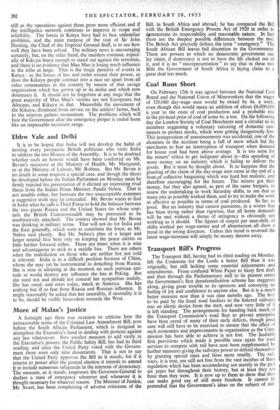Coal Runs Short
On February 12th it was agreed between the National Coal Board and the National Union of Mineworkers that the wages of 320,000 day-wage men would be raised by 6s. a week, even though this would mean an addition of about £6,000,000 a year to the costs of coal production and a probable rise in the pit-head price of coal of some 6s. a ton. On the following day the London Society of Coal Merchants sent a circular to its members suggesting a voluntary rationing of domestic con- sumers to protect stocks, which were getting dangerously low. This juxtaposition of announcements was accidental, one of the elements in the accident being a fall of snow which led the merchants to fear an interruption of transport when demand for house coal had been above average. It is too soon for the miners' critics to get indignant about it—this spending of more money on an industry which is failing to deliver the goods. But it must be thought about. It so happens that the granting of the claim of the day-wage men came at the end of a bout\of collective bargaining which was hard but realistic, and therefore encouraging for the future. The miners got their money, but they also agreed, as part of the same bargain, to renew the undertaking to work Saturday shifts, to see that as many pits as possible worked them, and to try to make the work as effective as possible in terms of coal produced. So far, so good. But an industry that cannot guarantee, in a winter that has been trying rather than rigorous, that all home demands will be met without a threat of stringency is obviously not working as it should. The figures of output per man-shift, of shifts worked per wage-earner and of absenteeism all show a trend in the wrong direction. Unless this trend is reversed the latest wage-increases will simply be money thrown away.


































 Previous page
Previous page